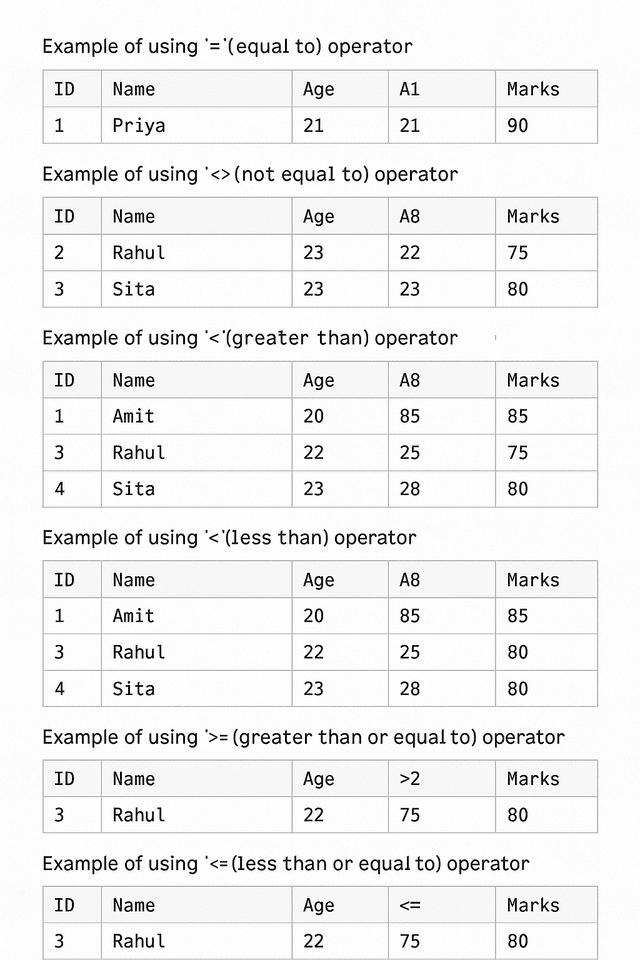Are you new to the world of databases and curious about how to filter data? Well, you’re in the right place! Comparison operators in SQL are fundamental tools that help you retrieve just the right data from your database. Whether you’re checking if a product price is greater than a certain value or finding records that match exact names, these operators have got you covered. But what are these magical operators, and how do they work? Stick around as we unpack comparison operators in SQL with real-world examples and easy explanations, making you feel right at home with SQL basics!
Understanding the Basics of Comparison Operators in SQL: Code Examples
-- Example of using Comparison operators in SQL
-- Create a sample table
CREATE TABLE Students (
ID INT,
Name VARCHAR(50),
Age INT,
Marks INT
);
-- Insert sample data into the table
INSERT INTO Students (ID, Name, Age, Marks) VALUES
(1, 'Amit', 20, 85),
(2, 'Priya', 21, 90),
(3, 'Rahul', 22, 75),
(4, 'Sita', 23, 80);
-- Example of using '=' (equal to) operator
SELECT * FROM Students WHERE Age = 21;
-- Example of using '<>' (not equal to) operator
SELECT * FROM Students WHERE Marks <> 85;
-- Example of using '>' (greater than) operator
SELECT * FROM Students WHERE Age > 20;
-- Example of using '<' (less than) operator
SELECT * FROM Students WHERE Marks < 90;
-- Example of using '>=' (greater than or equal to) operator
SELECT * FROM Students WHERE Age >= 22;
-- Example of using '<=' (less than or equal to) operator
SELECT * FROM Students WHERE Marks <= 80;
Explanation of the Code
In this SQL example, you’ll see how Comparison operators in SQL are leveraged to filter data efficiently. First, a ‘Students’ table is created that includes columns such as ID, Name, Age, and Marks. Then, sample data is inserted to populate the table with information about four students: Amit, Priya, Rahul, and Sita. The SQL queries utilize several comparison operators to retrieve data based on specific conditions:
- The ‘=’ operator selects records where the Age is exactly 21, as seen in Priya’s case.
- The ‘<>’ operator finds students whose Marks are not equal to 85, excluding Amit.
- The ‘>’ operator fetches students older than 20, grabbing Priya, Rahul, and Sita.
- The ‘<‘ operator identifies students with Marks less than 90, targeting Amit, Rahul, and Sita.
- The ‘>=’ operator retrieves students 22 or older, which includes Rahul and Sita.
- The ‘<=’ operator collects students with Marks up to 80, namely Rahul and Sita.
These queries illustrate how versatile and useful SQL comparison operators can be in handling data.
Output

Real-Life Uses of Comparison Operators in SQL
When we dig into practical scenarios where companies might use Comparison operators in SQL for real-life situations, it’s fascinating to see how these operators make data-driven decisions possible. Let’s go through some relatable examples:
- Customer Segmentation for Marketing: Imagine a retail company wanting to target promotions at high-spending customers. They might use comparison operators like `>` to filter customers who have spent over a certain amount in the past year, thus tailoring their offers effectively.
- Finding Top-Performing Products: A company could analyze sales data to identify their best-selling products. By using a combination of comparison operators such as `>=`, they can select products that have sold more than 1000 units, making it easy to focus on inventory restocking and marketing campaigns.
- Filtering Age Groups for Age-Specific Content: On a streaming platform, SQL comparison operators can be used to filter users based on age. Suppose a show is aimed at audiences aged 18-25; operators like `<` and `>` help ensure the content reaches the right viewers, aligning with legal and marketing strategies.
- Employee Performance Evaluation: In HR databases, companies often need to identify employees who meet certain performance criteria. For instance, using `=` to select employees with “Exceeds Expectations” ratings, making it simpler to decide on promotions or bonuses.
These examples collectively illustrate the role of Comparison operators in SQL as essential tools that empower businesses to unlock powerful insights and streamline operations. They’re not just about numbers on a spreadsheet; they’re about making informed decisions that directly impact strategy and growth.
Test Your Knowledge: Quiz on SQL Comparison Operators!
- What does the “=” comparison operator in SQL do?
a) Compares strings
b) Checks for equality
c) Computes numerical differences - Which operator would you use to find values greater than a specific number?
a) !=
b) >
c) <= - How can you check if two columns values are not equal?
a) NOT
b) !=
c) <> - Which SQL operator can test for values between two numbers?
a) BETWEEN
b) LIKE
c) IN - If you want to find entries that match a certain pattern, which operator would you use?
a) LIKE
b) =
c) BETWEEN
In conclusion, understanding comparison operators in SQL is crucial for manipulating and querying your data effectively. From checking equality to assessing sequences, they’re fundamental tools in every SQL user’s arsenal. Keep practicing, and soon SQL will feel as easy as pie!
Getting Hands-On Practice What’s better than theory? Practice, of course! Head over to our AI-powered SQL online compiler, where you can instantly write, run, and test your SQL code with the help of AI. You’ll find yourself getting the hang of these operators in no time.
Conclusion
In conclusion, understanding comparison operators in SQL is crucial for efficient data management and extraction. Whether you’re just starting or looking to refine your skills, explore more tutorials on Newtum. Happy coding! Dive deeper, practice often, and don’t hesitate to experiment with different queries!
Edited and Compiled by
This blog was compiled and edited by @rasikadeshpande, who has over 4 years of experience in content creation. She’s passionate about helping beginners understand technical topics in a more interactive way.



